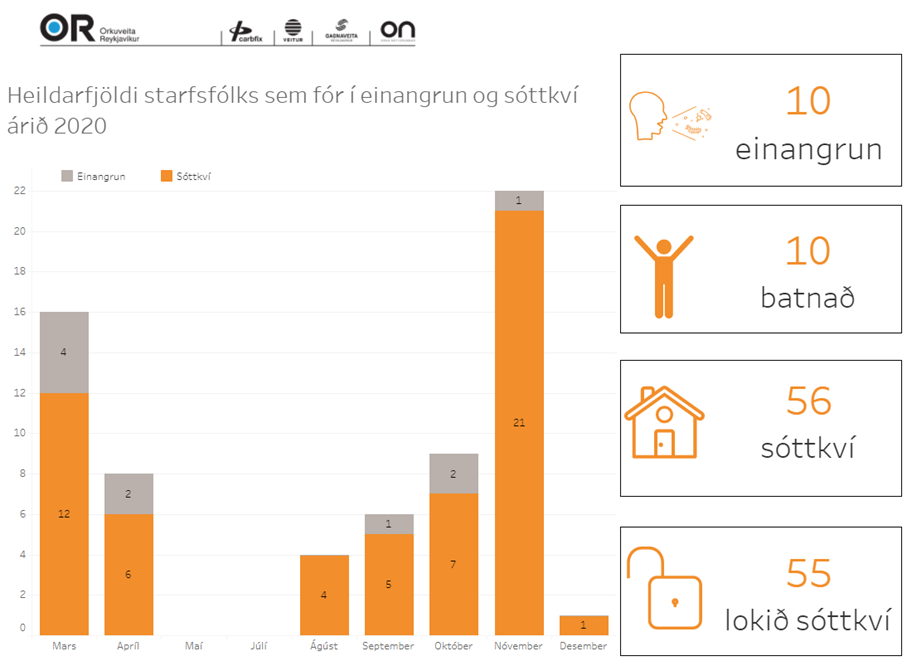In 2020, the COVID-19 pandemic had a profound effect on Reykjavik Energy Group and its subsidiaries' operations. Society's essential services, e.g. utilities and energy production, must be protected. The pandemic, and the response to it, also clearly demonstrated, that a reliable fibre optic network is a fundamental infrastructure for society's resilience. Reykjavik Energy Group is responsible for these public interests, and thus the response to COVID-19 was decisive and successful.
Crisis Management Committee and Dissemination to Employees
Reykjavik Energy Group's Crisis Management Committee held its first meeting in January 2020, in preparation for the imminent pandemic. Members of the Crisis Management Committee are the CEO, Managing Directors, Director of Environmental Affairs, Chief Communications Officer, and a member of the Health and Safety team. The Crisis Management Committee met 113 times during 2020, the subject matter always being COVID-19 and the Group's responses to it. At the Committee's meetings, rules were devised for the Group's operations, in accordance with public announcements and the subsidiaries' contingency plans.
Beginning March 2, the CEO of Reykjavik Energy Group sent all employees emails, in Icelandic and English, informing them about statistical data on COVID-19, in the community and within the Group, as well as announcing decisions made by the Crisis Management Committee. In 2020, these emails were 104. The following is an example of steps taken:
- Requesting disclosure in case of travel abroad, early on in the pandemic and before border screenings.
- Requesting that employees do not report to work if they or a family member are suffering flu-like symptoms.
- Specific precautions for the operational control room, e.g. complete separation of shifts.
- Specific precautions for work teams and specialist staff, e.g. by securing complete separation of groups.
- Continuous education, dissemination of information and motivation.
- Mandatory working from home.
- Gathering restrictions.
- General disease prevention measures.
- Mandatory mask wearing where social distancing is not possible.
- Rules and restrictions on conduct in employees' cafeteria.
- Temporary ban on meetings with third parties, other than video conferencing and later restrictions on meetings with third parties on Reykjavik Energy Group's premises.
- Recommendations sent to employees regarding general disease prevention measures outside work hours.
This resulted in no known cases of infection among employees and no breakdown in service. In addition, the number of sick days fell in 2020, as discussed in S8 Global Health & Safety.
The graph below is taken from Reykjavik Energy Group's instrument panel, devised by the Group on account of the pandemic. It illustrates accumulated numbers to the end of 2020.

Fewer Cut-offs
In the recent years, Reykjavik Energy Group has systematically worked on improving utility bill services. Emphasis is now put on assisting those who are in arrears. Service representatives have a wider range of solutions at their disposal, and the billing process has been streamlined. This has resulted in fewer bills being in arrears, and cut-offs due to nonpayment have decreased substantially.
In early 2020, when it was foreseeable that COVID-19 would deal an economic blow, a decision was made to further increase flexibility when billing, and cut-offs due to nonpayment reduced significantly between the years 2019 and 2020. Nevertheless, arrears have increased, mainly in the business sector.
Number of cut-offs
Effect on Carbon Footprint
Reykjavik Energy Group's carbon footprint suffered, and still suffers, multiple effect from the pandemic, as well as from the measures taken against it. Many of the changes implemented decrease emissions, others increase it. Flight emissions were almost completely wiped out during the year. For most of the year, a large number of employees telecommuted. Therefore, less actual commuting. In addition, commuting to meetings, either in the capital or outside it, was significantly reduced, thanks to telecommuting.
On the other hand, many employees work in constructions, and in order to safeguard their disease prevention, they were split into groups. Each group was assigned a vehicle for commuting purposes, from the Group's vehicle fleet. This meant more mileage was incurred by employees. In addition, disease prevention products increased waste.


The older photo shows a telephone pole on Laugavegur in Reykjavík about a century ago and the new one where fibre optic cables lie underground. Reykjavik Fibre Network’s grid now extends to approx. 75% of households in Iceland.
Credit: Sarpur/Þorleifur K. Þorleifsson and Reykjavik Fibre Network’s collection.
